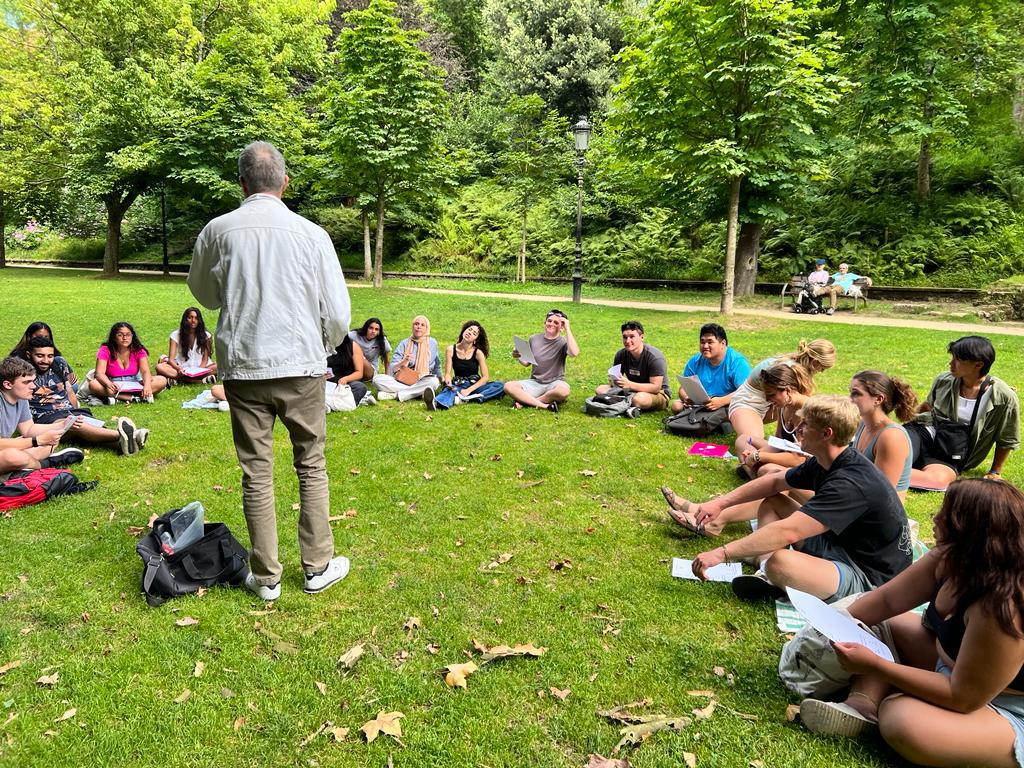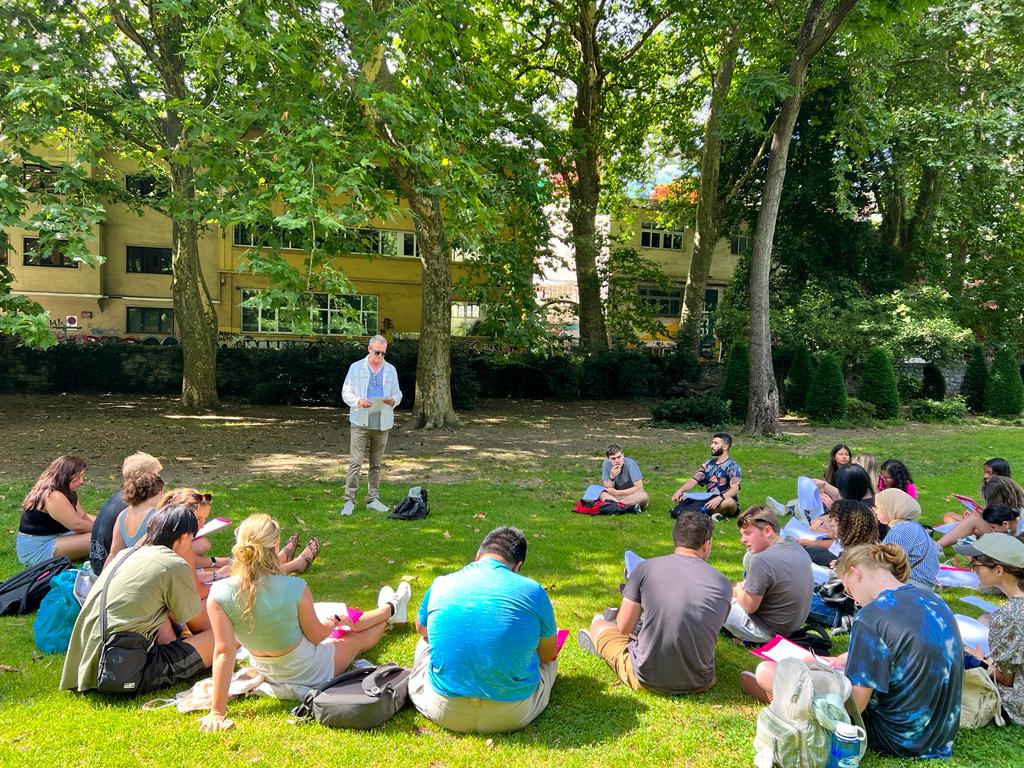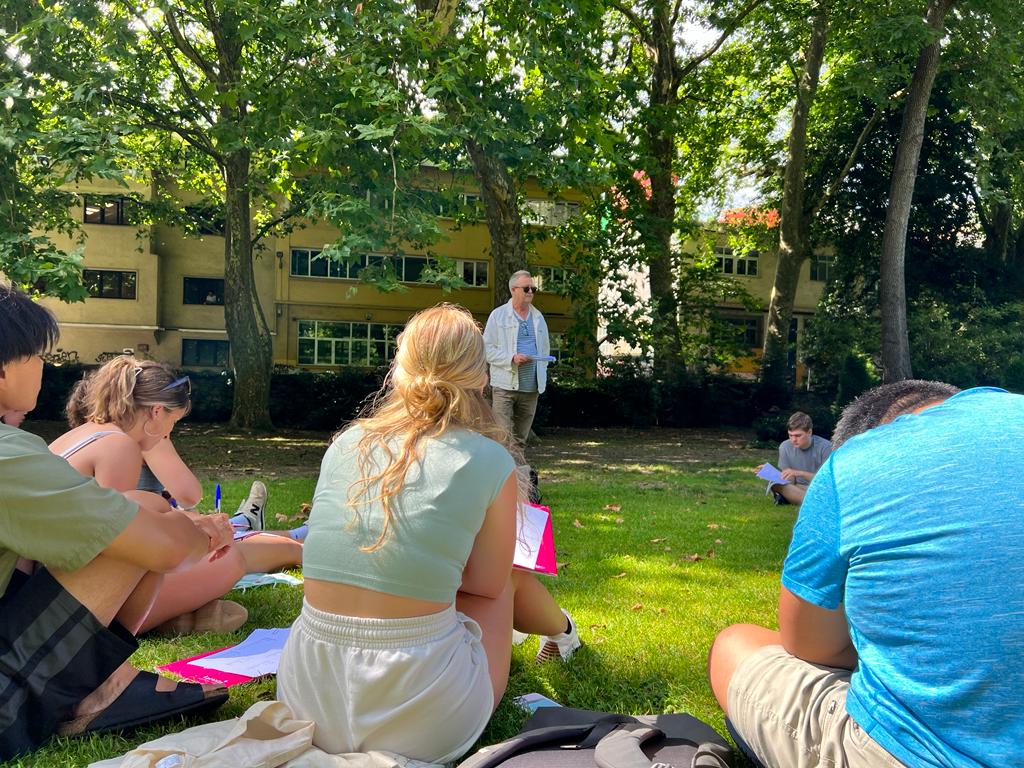After staying in the Basque Country for four days, we finally took a Euskara language class. The Basque language, also called Euskera, is one of the most unique and isolated languages with a fascinating history. Right before the class, however, my friend Michael Hood-Dowd and I had just ordered lunch from a small pintxo restaurant near La Cunza, which is the Spanish school that we go to in San Sebastián. Pintxos are small slices of bread in which, at first, seem to have the strangest assortment of food placed on top of it. Achovies, eggs, and pickles placed on top of a piece of bread may look strange and offputting, but it tastes great! Soon, however, Michael and I won’t just be eating like Basques, but we will talking like them too.
Sitting in a circle at a beautiful park, our teacher, Stuart Little, who was not Basque, but actually Scottish, taught us Euskera. The only thing I had known about the Basque language was that words with “tx” in in, make a “ch” sound from the Basque Country cookbook by Marti Buckley. Letters that we don’t commonly use in the English or Spanish language, like “k”, “x”, and “z”, are prevalent in Euskera, causing the language to sound very rough and jagged.
This language utilizes phonemes that help it to set it apart from other languages. Some examples are the “tx” making a “ch” sound, “z” sounding like the “s” sound in the word silent, and “ts” sounding like it does in the word bats. These phonemes are found throughout Eukeran’s words.
Simple greetings we learned like hello was “Kaixo”, pronounced “kai-show”, or goodbye, which is “Agur”, however, the “r” at the end is rolled. The most common one that was used during the presentation was the word for sorry, “Mesedez”, in which the emphasis is on the second “e”, pronounced almost like “Meh-say-des”.
The origin of the Basques are also fascinating. Going all the way back to the 1st century AD, there has been some evidence that the Basque have existed in Navarre and Aragon, which are now northern Basque provinces in Spain. People are not sure if the Vascones, the tribe that lived in those provinces, were ancestors of the Basques. As there is limited evidence, besides a few Ancient Roman tombstones, the origin of the Basque Country has a completely unknown origin.
An interesting fact about Euskera that is different from both Spanish and English is that they do not use plurals when talking about more than one of something. For example, when asking for two black coffee coffees, they say “Bi kafe huts”, in which “Bi” is two, “kafe” is coffee, and the huts is describing the type of coffee as black coffee. In that example it is not “Bi kafes huts”, but “Bi kafe huts”.
Also, in the Basque language, if someone only wants one of something, they will say the noun first and then say one. For example, instead of saying “one wine”, they say “ardoa bat”, which is “wine one”.
It was interesting learning how many talented and special people have come out of this small place. As a music major, I was glad to find out that the composer Maurice Ravel was a Basque, born in Cibourne, France. Several famous soccer players and golfers have also come out of the Basque Country. Not only famous people, but famous everyday objects like the stapler and a ship rudder was invented in Basque Country including the first use of whale blubber in soap. It is also speculation that the Hobbits from J.R.R. Tolkien’s The Lord of the Rings was based on the Basque culture, as Tolkien was a linguist, creating several Middle Earth languages for his books.
One of my favorite things that I learned about was the Basque surnames in which our teacher, Stuart, told us about a friend he had whose full name in English was Mother Earth Fire Mountain Chicken Path. I can’t remember what it was in Basque, but it cannot be matched, it is definitely the coolest name I have ever heard.
On this trip, we have been bewildered by several city store signs utilizing the letters “tx”, “k”, “x” or “z”. Now knowing that those signs were in the language Euskera has helped me to realize how special Spain is. This extremely small territory, not even as big as New Hampshire, is still alive and held sacred by the locals throughout so much change in our world and especially in Europe. It is fascinating, Agur!



